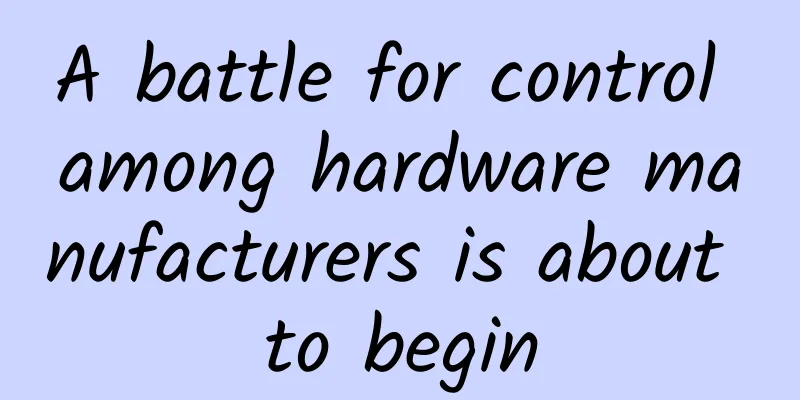A battle for control among hardware manufacturers is about to begin

|
Digital software and data are essentially free because the cost of copying and reusing them is zero. This feature destroys Microsoft's license fee model and turns the essence of competition into a battle for control. A lot has been said about the role that software can play in this process, but less has been said about the role that Atom-based hardware can play. This article explores this question. A digital world There is no doubt that the degree of digitization is deepening: the records of everyone’s lives are almost 100% digitized, and the degree of digitization of corporate behavior is almost the same as that of individuals. With the development of the Internet of Everything, products in the industry, such as turbines, will also generate their own digital descriptions. This digitalization has a dual meaning. One is that various objects, such as people or companies, have their own data descriptions, and the other is that there must be corresponding behaviors on these data to make these data related and interactive. If the customer flow of a store is counted without analysis and without affecting actual business decisions, then this kind of dataization is essentially worthless. The above two points are happening now, and will certainly continue to deepen in the future. But many people do not realize that the process of digitalization is also a process of transfer of control. When everything made of atoms is finally digitized, the newly developed fundamental needs will actually form digital handles. For individuals, needs such as chatting and finding information have already spawned new categories such as IM and search engines, which is a fact that has already happened. This transfer of control will subvert the existing business model. We should not forget that how much money a company makes depends on its control over the system consisting of brands, users, products, services, suppliers and other elements. The transfer of control is precisely this control, so it will inevitably lead to changes in the business model. For example, after the launch of WeChat, SMS became a dispensable service, so it is obvious that the corresponding profits will be transferred from operators to Tencent. In this process of control transfer, pure hardware companies are in a very awkward position. Because from a broader perspective, the transfer of control is from the real space to the digital space, and pure hardware companies are only providers of infrastructure, and they do not have such control. Pure hardware companies are doing things that are far more difficult than software companies, while at the same time they are losing control in the digital world and becoming a simple channel. Why is hardware difficult to make and not easy to make money? Internet companies use software to acquire customers. In the early stage, the cost of adding a customer is almost zero. In the later stage, it is mainly the user acquisition cost such as traffic. Therefore, the foundation of the profit model of Internet companies is the user scale and the number of active users. For each additional user, hardware companies have to pay for logistics and other costs in addition to hardware costs, so they cannot have the user scale of software companies. This gap can be compared to the app stores. According to a report by Questmobile on July 14, the DAU of App Store is 28 million, and that of 360 Mobile Assistant is 18 million. The DAUs of the best app stores of Huawei and Xiaomi are 3.32 million and 1.41 million respectively, which is about 10 times the difference. This further leads to the difference in the nature of digital business and atomic business. In the digital business, companies can make money by relying on ARPU (average revenue per user), but in the atomic business, companies cannot survive by relying on ARPU. What’s worse is that hardware companies may have no say in what software users use on their devices. Even if you pre-install the software, users may not necessarily use it. For example, Samsung has no chance to build an app store to compete with Google Play in foreign countries. In this case, it is necessary to differentiate purely in hardware, but this is really difficult. Any change in the production process is actually very difficult. Size, thickness and other things will become more and more difficult to deal with later. The key is that users may not feel it. In this way, hardware companies will become channels, which is the same trend faced by operators. But the advantage of operators is that a certain degree of monopoly can ensure that users must pay tolls, but in the market of general hardware products such as mobile phones, there is no protection at all. Simply put, hardware companies do not produce enough software and do not have the right to set prices in the entire ecosystem. The most traditional sales model faces the situation of being unable to differentiate, so it is very difficult to do. Where is the way out? So where can hardware companies find a way out? The first is Apple's way of playing, which is to not distinguish between software and hardware, but only output the experience. This is equivalent to doing everything yourself. The second is to use the window period of new categories to transform themselves into a software and data company and compete for control of the system. They outsource the production of hardware to companies like Foxconn, while Foxconn can introduce robots and other technologies to greatly optimize its production process. This is equivalent to upward development. The third is to really make your products different, so you need to have real advantages in screens, CPUs and other factors. Samsung is on this path. But it is very difficult. The scale effect of Internet companies is difficult to copy, but considering the flow of talent in hardware, it is actually difficult for you to handle it while others cannot. The companies that really have technical advantages are mainly Qualcomm and Intel. This is equivalent to moving forward. Fourth, if there are highly personalized products, such as watches, then the design and other aspects can establish an independent brand. But judging from the performance of Apple Watch, this is not very easy. This is equivalent to the oldest brand route, giving non-technical components in the product more say, which has not been proven in the technology industry. It has been proven in the clothing and watch industries. Expensive watches are never expensive because they are accurate. The core advantage of hardware is that without hardware, there is no entry to interact with the digital world. In the early stages of a new category, only hardware companies have the opportunity to integrate products with a good enough experience. The barrier to hardware lies in the complex production and sales chain, which is difficult for software developers to handle. Therefore, for hardware companies, it has a first-mover advantage in gaining control of the system. Battle for control If we further divide it, we can divide a company's position in the ecosystem into three levels: the first is having control over the entire system, such as Google's control over the Android ecosystem; the second is having a say in the alliance (most of the time I am indispensable), such as Qualcomm; the third is having no say at all. Various mobile phone manufacturers are actually in this state. Then we divide all businesses into government, industry, enterprise and individual. Then we can find that the best model in the personal field is the model of Apple and Google, that is, hardware companies should either build an independent ecosystem or take advantage of the opportunity of new categories and transform into backend. The downward development mentioned above, relying solely on hardware differentiation, is a high-investment but low-chance idea. The more computing moves to the backend, the less likely it is to differentiate hardware, the weaker the voice, and the less likely it is to make money. The situation is similar in the enterprise sector. The underlying reason is that hardware and software are basically separable in these two sectors. Only in the initial stages do people who do both hardware and software have an advantage in controlling the user experience. Later, once Android appeared or computing moved to the cloud, hardware and software began to separate, and hardware companies lost their voice and became just channels. The industry direction is a little different. Due to the scale, there is no intermediary like Android. Therefore, digitalization itself will lead to the integration of software and hardware. Therefore, the underlying trend is that hardware companies will become solution providers, that is, provide both hardware and software. To Government business is likely to be more like this. This means that the most critical node for hardware companies is the emergence of completely separated software and hardware systems such as Windows or Android. Before the clear division, the entire ecosystem was basically dominated by hardware. After the clear division, whoever has control can make money. After the clear separation of software and hardware, the most difficult thing is to make products. For example, mobile phone manufacturers have little impact on Qualcomm and Intel, which have particularly high technology added value. Their high technology added value ensures that they will find their place in any ecosystem. This puts higher demands on hardware companies that make products. You not only need to know what to do next, but also know where the control point is and what you really want. It is not enough to just know how to make mobile phones. You also need to know what role mobile phones can play in subsequent links. So what exactly is this control point within the visible range? It will be different for different ecosystems, but there are indeed several patterns that have emerged. One way to compete for control points is Google's method, which is to use the upper layer of open source standardized hardware, which can be an operating system (Android), and then control the content-based services derived from this layer of the system (Google Play). The operating system layer can go up to become an intelligent layer, or it can go down, such as open source hardware, so that a certain type of hardware is based on the same development board and SoC. Cognitive advantage is very critical here. When everyone thinks it is important, there is no chance. One way to compete for control points is to form an alliance, but ensure that you are indispensable, and then ensure your right to speak, such as the Wintel alliance. Huawei's approach to cloud computing is to not touch applications from above and data from below, and this is actually the path it takes. In this way, as long as the ecosystem can win, it can win. One approach to control points is general intelligence, and if it exists and is data-driven, then just maintain your data advantage. Conclusion The most interesting thing here is that from the perspective of control, there will only be one controller for a piece of land, so for the future, you either have to be ambitious and paranoid and succeed, or you will die. It seems that it will become increasingly difficult for large companies to survive. The long tail effect may become more and more obvious in the future, and the top companies may be bigger than Apple. Original link: https://www.huxiu.com/article/164032.htmlAs a winner of Toutiao's Qingyun Plan and Baijiahao's Bai+ Plan, the 2019 Baidu Digital Author of the Year, the Baijiahao's Most Popular Author in the Technology Field, the 2019 Sogou Technology and Culture Author, and the 2021 Baijiahao Quarterly Influential Creator, he has won many awards, including the 2013 Sohu Best Industry Media Person, the 2015 China New Media Entrepreneurship Competition Beijing Third Place, the 2015 Guangmang Experience Award, the 2015 China New Media Entrepreneurship Competition Finals Third Place, and the 2018 Baidu Dynamic Annual Powerful Celebrity. |
<<: Samsung Note 7 explosion: It's like walking on a towering building
>>: Yingke Huajiao was ordered to rectify its video live streaming business and faced three pitfalls
Recommend
How to quickly increase the popularity of your live streaming room?
Live streaming has become a standard sales method...
How to achieve a closed-loop traffic flow through short video promotion? !
With the popularity of short videos and live broa...
From ad images to landing pages, 14 tips to improve conversions
This article is a summary of the book "The B...
Why have domestic mobile phones made a comeback?
Global mobile phone market landscape Data from th...
How to set up a TikTok advertising account
introduction Advertisers who are new to TikTok pe...
Raising Alsophila spinulosa as a potted plant? Beware of life in prison
If you walk into the greenhouse of Wuhan Botanica...
Do "intermittent fasting", "quitting dinner" and "cutting carbs" really work? The new version of the national weight loss guide is here!
Recently, the National Health Commission released...
Jia Yueting: If Samsung TV doesn't reform, it will be overthrown by LeTV
It is obvious that after experiencing the rapid v...
How to make reasonable use of 3 types of ground promotion methods?
A few days ago, when I passed the Gaoxinyuan subw...
China Meteorological Administration issued three warnings in a row (full text)
China Meteorological Administration issues three ...
Why does urine turn yellow when drinking less water?
Maybe everyone has noticed that sometimes when yo...
Don’t be careless if you experience these 5 abnormalities in your body, they may be signs of lung cancer!
Recently, according to Beijing Youth Daily, Mr. L...
The battle between enthusiasm and rationality in the video industry from the hit of "The Pancake Man"
The movie "The Pancake Man" invested an...
Douyin corporate account advertising is now online! This article will let you know about it!
Douyin Enterprise Account is the "official a...
Strategic plan for online operations during the epidemic period
The following is an outline of the content of thi...









